Slugs they’re not the cutest of animals, and not many of us like or even respect them. What exactly is the purpose of a slug? Are they good for anything? The answer is yes. Slugs have a purpose, just as much as other animals do. Here are some of the benefits of slugs.
What Are The Benefits of Slugs?
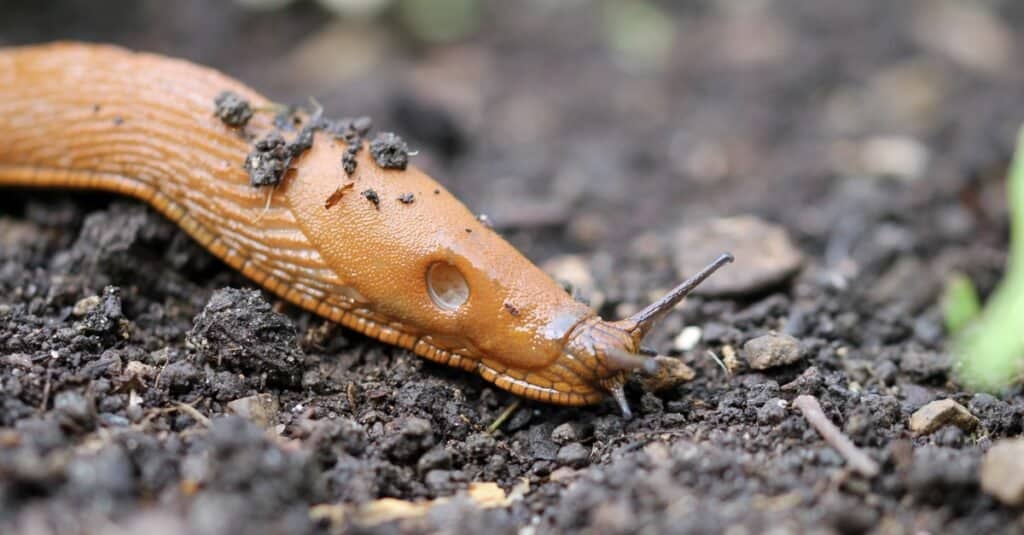
Slugs are one of the most persecuted animals on the planet.
©Art_Pictures/Shutterstock.com
Gastropod slugs are soft-bodied mollusks with rasping tongues that create uneven holes in vegetation. We only notice the vegetation we love, such as our prize veggies and hosta collection, but in the background, slugs are getting on with numerous other tasks. They don’t just exist to annoy us.
Misunderstood slugs might be the most persecuted animal on the planet. Still, they clear away rotting vegetation, provide food for numerous animals, teach children about nature, and even boost the compost heap.
Let’s take a closer look at poor old slugs and their benefits.
The Purpose of Slugs Is Just Existing
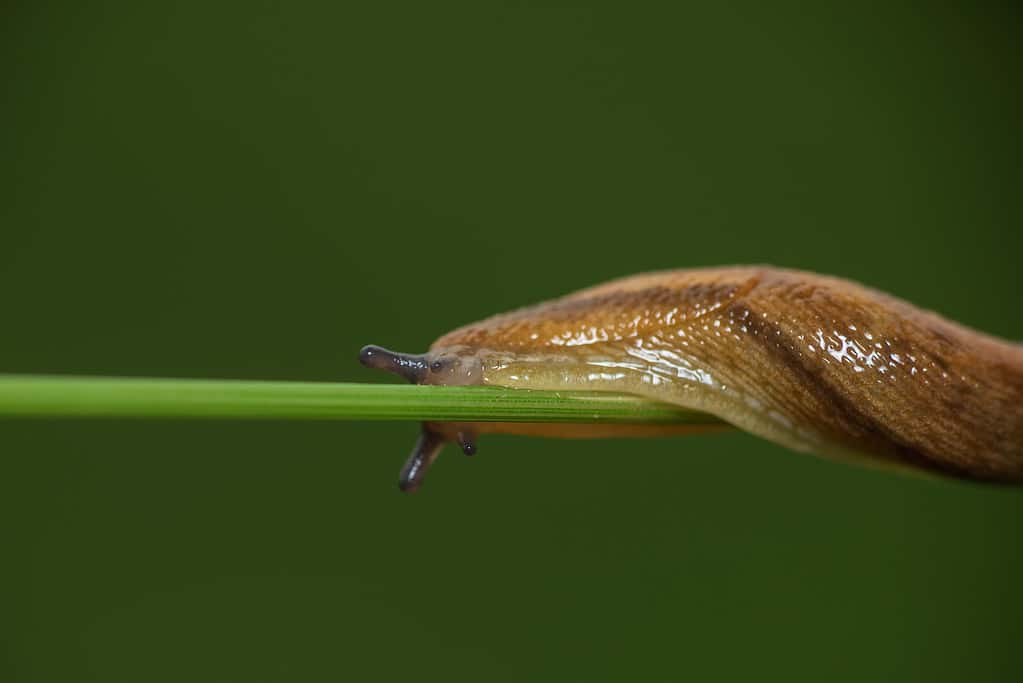
A slug aims to look for food, shelter, and mates.
©Fug4s/iStock via Getty Images
A slug’s main purposes are finding food, shelter, and mates. Isn’t that the same as a human’s purpose? Without delving into philosophy, not every animal has to serve a purpose as humans see fit; their purpose is living.
That said, here are slug benefits.
They Clear Away Dead Vegetation
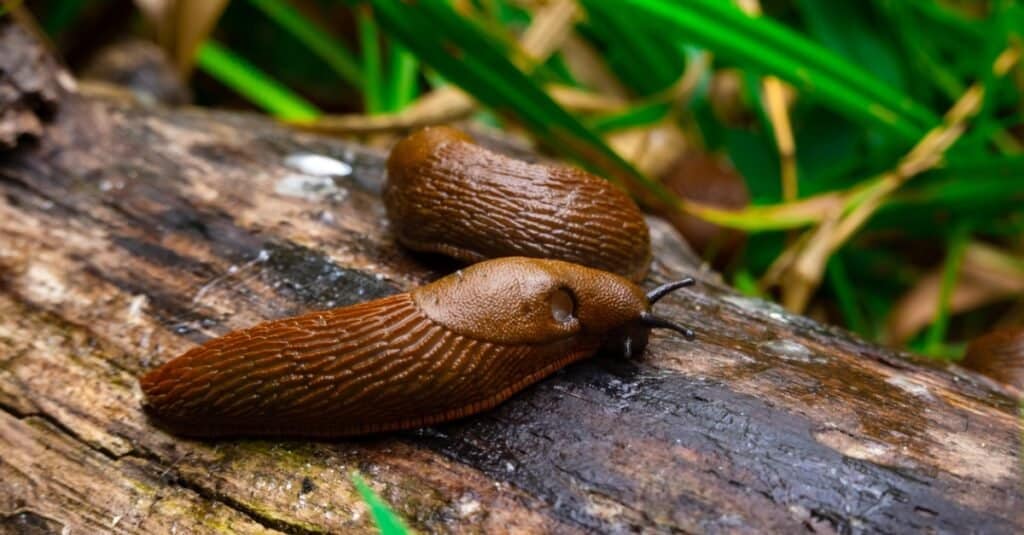
Slugs eat dead plants, feces, carrion, and lawn mushrooms.
©iStock.com/Ja’Crispy
Scavenger slugs eat decaying matter; it’s one of the top benefits of slugs. Here’s what a slug eats:
- Dead plants
- Rotting plants
- Deadwood
- Leaf litter
- Lawn fungi
- Windfall fruit
- Carrion
- Bird feces
- Cat and dog poop
Slugs recycle waste, breaking down dead or rotting matter. Unfussy slugs provide a free clean-up service, but sometimes they fancy a juicy, fresh cucumber. Can you blame them?
They even eat cat and dog poop. Yes, that’s right. Slugs love to chow down on grain and meat-ripe poop. Handy that, and possibly one of the top benefits of slugs.
Compost Heap Boosters
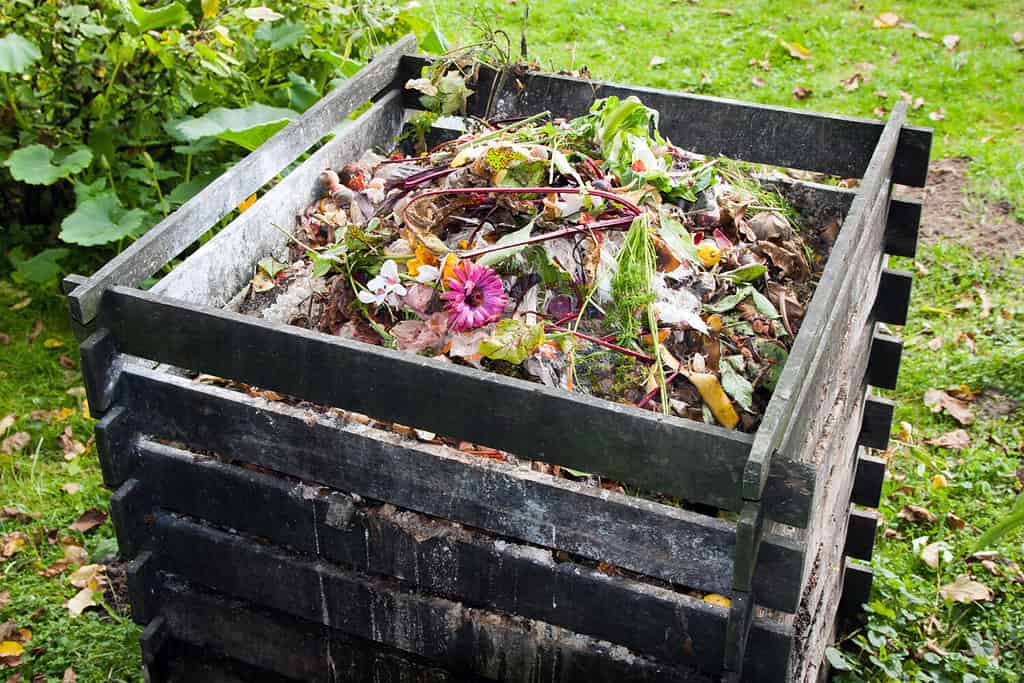
Slugs speed up decomposition in a compost pile.
©Evan Lorne/Shutterstock.com
Some garden-savvy folks have stopped killing slugs with poison and salt. Instead, they’re harnessing slugs’ incredible decomposition abilities.
Popping a few slugs in your compost heap can help break down waste quickly. If you choose to do this, surround your compost heap with sharp stones and copper tape so slugs don’t make a break for freedom and demolish your hard-won veggie garden. Slugs do not like sharp surfaces on their soft foot, and copper tape gives them a small electric shock.
Predatory Slugs – Your Worst Nightmare
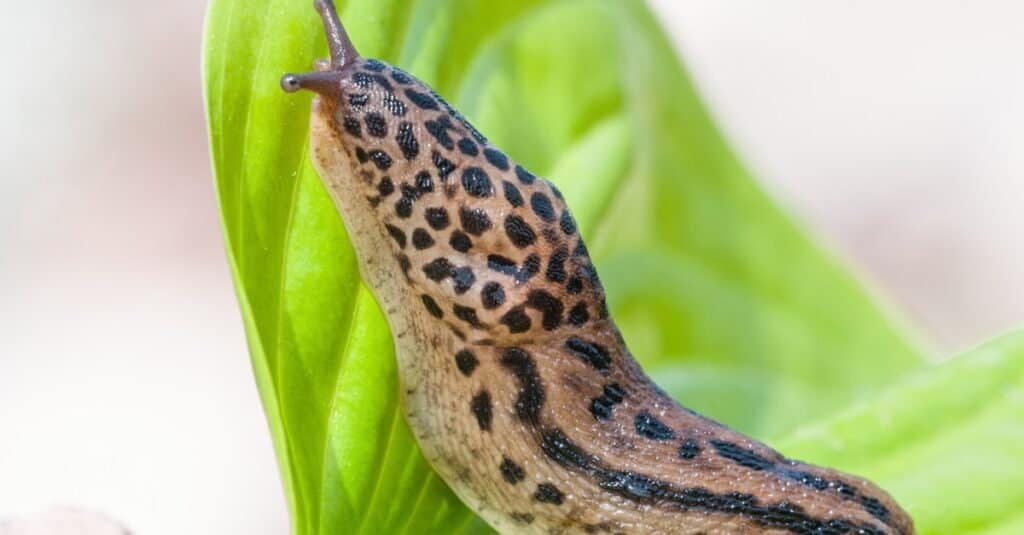
Leopard
slugs eat other slugs, snails, and insect larvae.
©MMCez/Shutterstock.com
Slugs have 27,000 teeth that form a rounded band called a radula. Slugs use this gaping, rasping mouth to grind and scuff plant matter into their stomachs. Now imagine a car-sized slug—nightmare fuel, for sure.
But wait…
Limax maximus, the great grey slug or the leopard slug, is commonly found in yards. This four to eight-inch-long epic slug is a cannibalistic predator. Not only does it eat decaying matter, but it also hunts other slugs, snails, maggots, and insect larvae. That certainly counts as one of the benefits of slugs.
They’re a Nutritious Food Source
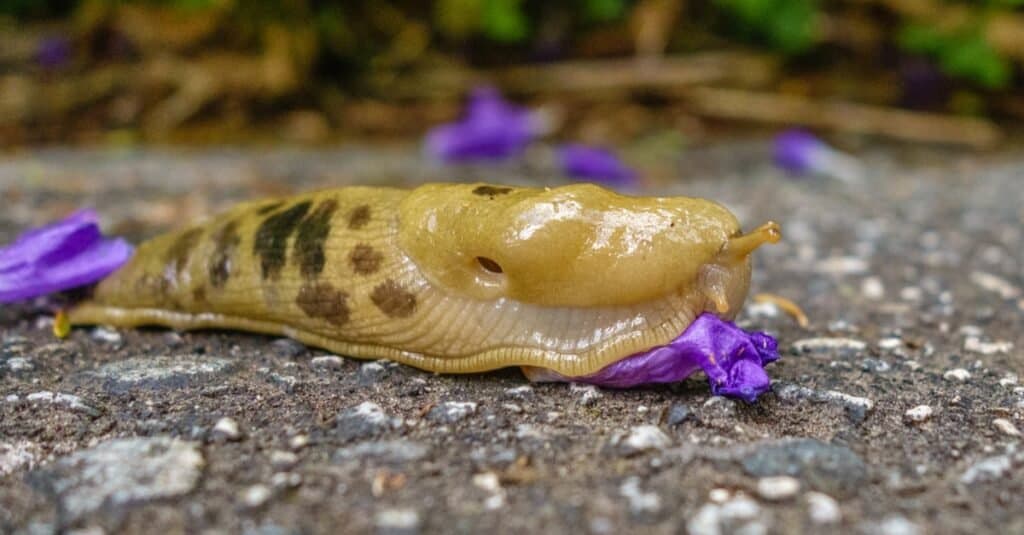
The Yurok people eat banana slugs during an annual slug festival.
©Heidi Besen/Shutterstock.com
One of the top purposes of slugs is to provide a nutritious food source for wildlife. Many creatures happily scoff down a sluggy supper, even though they often contain parasites that make mammals, like hedgehogs, unwell.
Here’s a list of the animals that eat slugs:
- Toad and frogs
- Lizards
- Ground beetles
- Birds, especially thrushes and blackbirds
- Snakes
- Rats and shrews
- Turtles
- Ducks and chickens
- Foxes
- European badgers
- Humans
Yes! Some folks eat slugs.
In the Pacific Northwest, the Yurok folks eat large banana slugs to celebrate an annual slug gastronomy festival, and in survival situations, slugs form a nutritious meal.
Each contains around 90 calories for every 100 grams, 16% protein mass, and many essential minerals. The issue with humans feasting on slugs is their parasite burden and infectious disease risk. Slugs (and snails) can cause rat lungworm and fatal meningitis.
Anyone who needs to eat a slug must thoroughly cook it.
They’re Incredible Acrobats
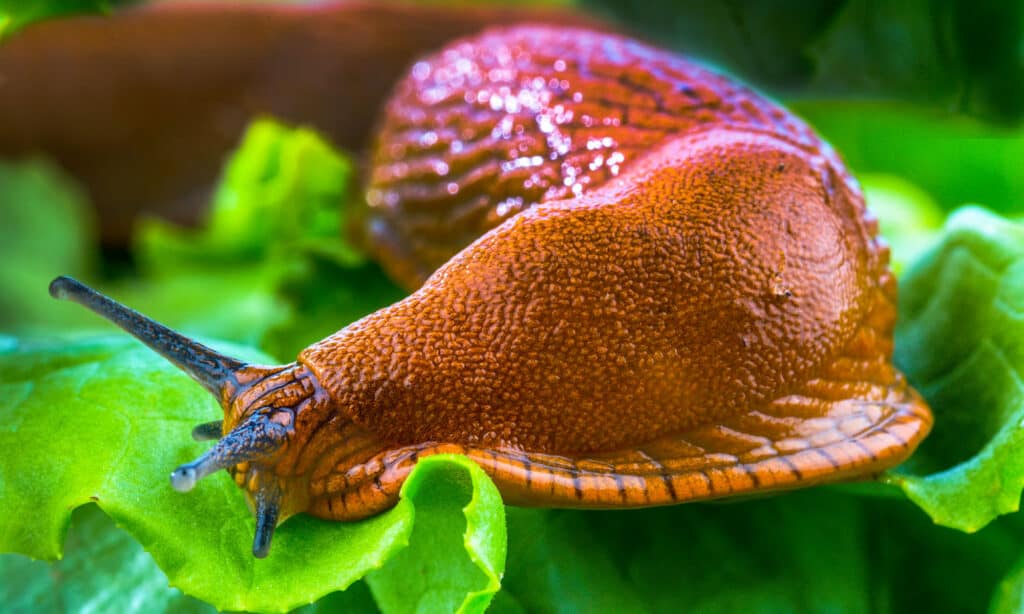
Slugs are incredible acrobats, capable of hanging from a branch in mid-air.
©Lisa-S/Shutterstock.com
Sit back and admire a slug’s incredible acrobatic ability. Without a shell, a slug can flatten its body to such minuscule proportions that it fits down the smallest opening, reaching 2-3 feet beneath the soil. Also, slugs can hang upside down, twist, and eat in mid-air, which is impressive.
Easily Accessible Learning Tool

A benefit of slugs is that they help teach children about the natural world.
©Sunny studio/Shutterstock.com
Every yard has a slug resident, making it one of the natural world’s most easily accessible learning tools for children.
Watch a slug move without traditional feet or paws; how does that happen? Well, place one (use gloves to avoid parasites) on a transparent, vertical surface and watch its incredible foot go to work. That’s a physics lesson and respect for the natural world.
Do Slugs Feel Pain?
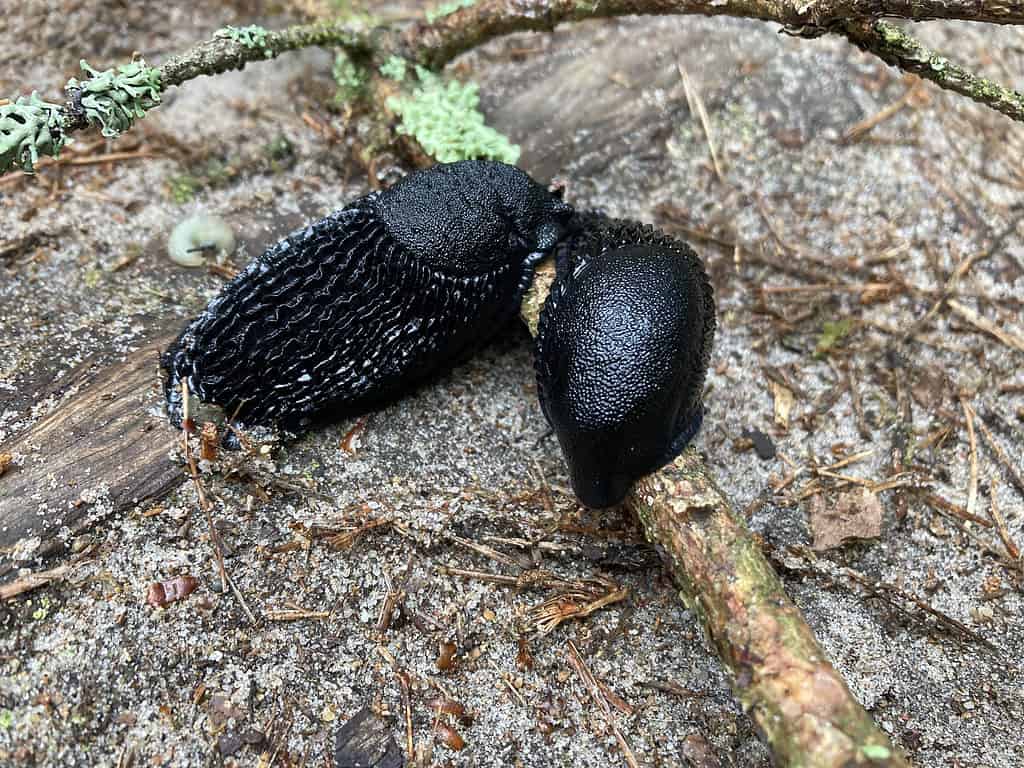
Choose natural predators, sharp gravel, and copper tape to fend off slugs, not poisons.
©iStock.com/mdurajczyk
Yes, slugs feel pain. We can’t hear them in distress, but like all creatures, they feel pain.
That’s why poisoning slugs with chemicals and sprinkling salt on their tail is cruel. Slugs form part of our natural world; there’s a kinder way to protect your crops.
Encourage natural predators like thrushes and frogs, and use eggshells, gravel, wool, and copper tape to protect your precious plants.
Are Slugs Intelligent?
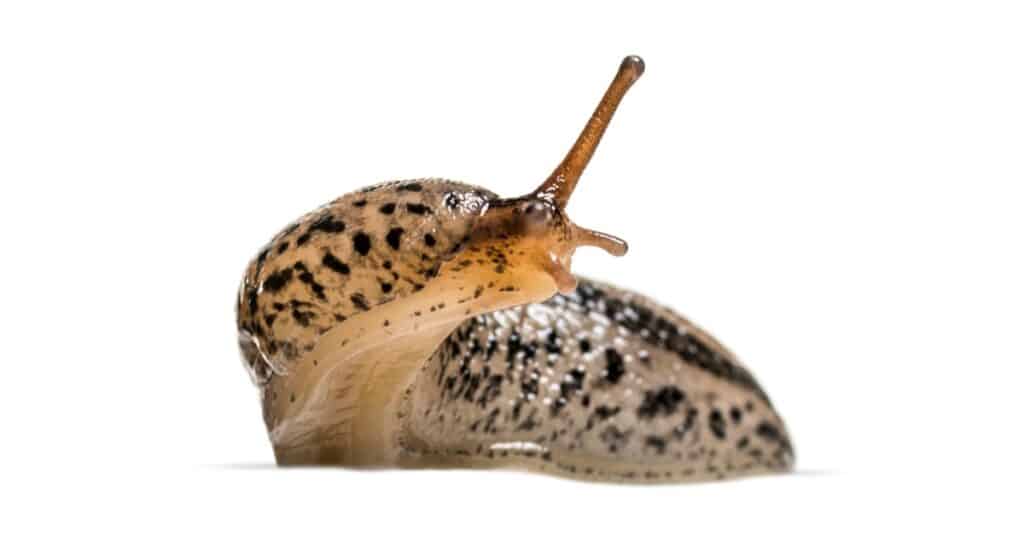
, the leopard slug, can tell if its food is nutritionally rich.
©Eric Isselee/Shutterstock.com
Even though slugs don’t look clever, research indicates they are more intelligent than scientists thought.
Slugs in a laboratory have been trained to avoid tasty slug foods with an unpleasant coating. Not only this, as most gardeners know, throwing a slug over the fence does not make it look elsewhere. They have an inbuilt homing system that experts think is scent-based. Slugs find their way to a resting place daily and return to prime feeding spots.
Slugs won’t ever invent a supercomputer, but in their way, they have intelligence. The leopard slug we mentioned earlier is a good example. Limax Maximus can detect food without nutrients. For example, when scientists removed an amino acid called methionine from slug food, the slugs avoided it in favor of amino acid-rich food.
The Benefits of Slugs
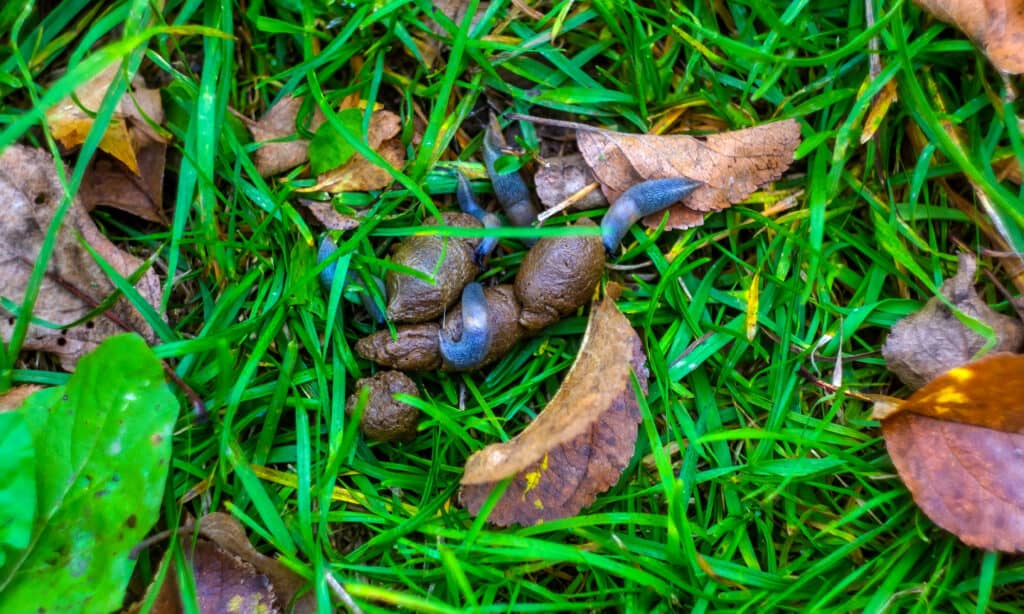
Slugs have a purpose; they even clear away pet poop for you.
©moskvich1977/Shutterstock.com
Yes, there are benefits to slugs.
They benefit humans by eating rotting matter and breaking down a compost heap. Wildlife (and sometimes humans) bodies are packed with rich nutrition.
But slugs don’t need benefits; they try to exist in the world, much like us.
The photo featured at the top of this post is © A-Z-Animals.com/A-Z Animals
Thank you for reading! Have some feedback for us? Contact the AZ Animals editorial team.






